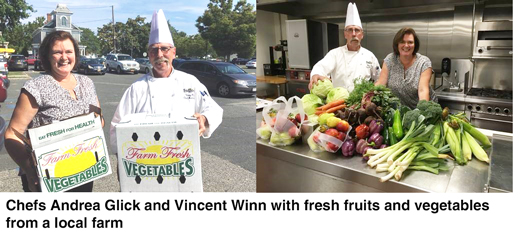For Immediate Release
September 18, 2019
Community Supported Agriculture, The Right Recipe for Suffolk’s Culinary Arts Program

Suffolk County Community College Culinary Arts & Hospitality Program Faculty Chefs,
Andrea Click and Vincent Winn, with fresh fruits and vegetables purchased through
the CSA program.
Culinary students at Suffolk County Community College’s Culinary Arts program are getting a lesson about farm-to-table cooking thanks to a relationship with Riverhead’s Zilnicki Farms and the farm’s community supported agriculture (CSA) model.
“By utilizing the CSA model we are able to purchase local produce and build farm-to-table into our instruction,” said Suffolk County Community College Eastern Campus Executive Dean Irene Rios. “We will use the farm’s produce in classes to highlight the benefits of purchasing locally, supporting local farmers and Long Island’s agriculture community. We’ll also be exposing students to the farm’s website and online ordering platform,” Rios said.
The culinary program purchases approximately $120 worth of fruits and vegetables per week through the CSA.
Community Supported Agriculture is a farming model in which consumers purchase food directly from the farmers who grow it. In the winter and spring, CSA members pay in advance for a share of the food to be grown during the upcoming season. Members share in the bounty of productive seasons, as well as the risk of less abundant years. CSA members help ensure the ongoing presence of local farms in the community and become connected with their food and the people who grow it.
Community supported agriculture shares have grown in popularity in recent years. In 2015, about 7,400 farms in the United States sold products directly to consumers through community supported agriculture models, according to the United States Department of Agriculture. It’s difficult to determine how many area farms offer CSAs, since many are small operations that don’t advertise or register their services.
“The Community Supported Agriculture model provides students with an understanding of the economics of food and farming while simultaneously supporting local farmers and spotlighting locally grown products,” said Suffolk County Community College Interim President Louis Petrizzo.
Last revised: 9/18/2019. For comments on this webpage, contact: The Director of Communications.
